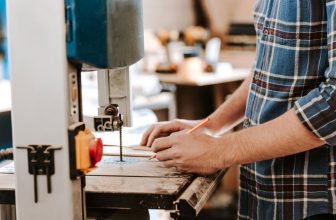Contents
The fence and miter gauge help you to make accurate cuts on a table saw – and it’s crucial that your table saw is well equipped in this department!
Otherwise no matter how good your table saw and blade are, you’ll be constantly let down by inaccurate cuts.
The fence ensures that your piece moves straight and true through the blade for an accurate cut, while the miter gauge allows for cutting miters and other specialised cuts.
They’re pretty simple components, so you should know all you need after reading this article.
The Fence
The fence is a flat-fronted piece of metal or plastic parallel with the blade and is attached to rails that run along the edge of a table saw, perpendicular to the blade.
When cutting, you place your workpiece along the fence to hold it steady and straight as you pass the piece through the saw. It can be adjusted along it’s rails to set the right distance from the blade for your cut.
A fence’s job is to help you make straight cuts.. in order to do that, its rails and clamping mechanism needs to be reliable.
Some cheaper table saws will have a plastic fence that won’t be reliably square when you place it, which means you’ll have to double check that it’s straight and true with a tape measure before every cut.
Another annoying thing that can happen with cheap fences is they don’t slide along their rails easily. They stick and fight you.
On the other hand, a great fence will do just what you need without having to “baby” it.
You could slide it smoothly along the rails with one finger, then lock it in place securely with the drop of a handle, while resting assured that it’ll be dead straight every time.
Thankfully, fences aren’t super expensive and can be upgraded if needed, but if you want to avoid the hassle, consider getting a table saw with superior fence such as Dewalt DWE7480.
The Miter Gauge
The miter gauge on a table saw has a pretty obvious job (based on it’s name)…
It helps you cut accurate miters. Basically it’s a device that runs along a rail in the table that can hold your piece at an angle between 45 degrees and -45 degrees.
You set the angle, hold your piece against the gauge, and push both along the table. The gauge will hold the correct angle as the piece passes through the blade, making a cut at the angle you set.
You’ll probably use this mostly for simple 90 degree crosscuts. Simply set the gauge to 90 degrees and lock it, place the piece against it, and slide through the blade. Super easy and precise crosscuts every time!
Once again, this is clearly a very important component on a great table saw – and, a great table saw can be let down by a bad miter gauge.
As with the fence, it’s an easy upgrade if the one which comes with your table saw isn’t up to scratch.
Like the fence, the miter gauge should lock in place accurately, securely, and easily. Then, it should run smoothly through it’s groove in the table.
Side note: Here’s a tip – if your fence or miter gauge isn’t running smoothly, just wax up the rail or groove and it should help.
Conclusion
Not only are the fence and miter gauge used to make accurate cuts, but they’re also very important for safety when using a table saw. The help to control your pieces and hold them steady, which great reduces the risk of the dreaded kickback.
You should never try to freehand a piece through a table saw – that’s just asking for trouble. Always use a fence or miter gauge.
If the fence or miter gauge that comes with your table saw is sub-par, definitely upgrade. It should be a cheap upgrade – or you could also consider making your own out of wood. Makes for a pretty good project!






